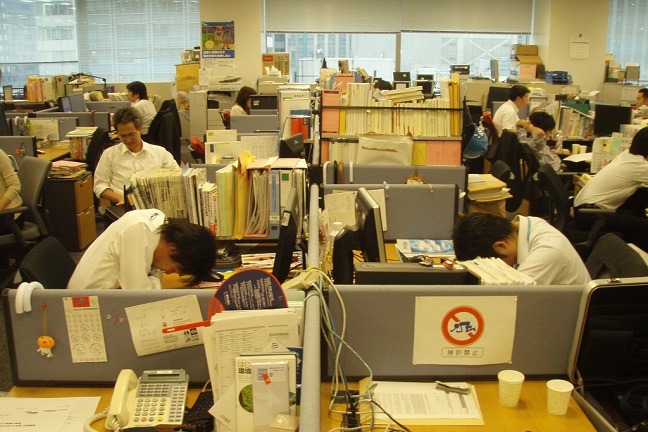Japan has long had a culture of overwork, with employees in a variety of sectors reporting hard working hours, high pressure from managers and deference to the company, but it is virtually impossible to apply to leave a job, according to CNN.
The recycling problem has become so severe that the government has begun publishing a list of unethical employers to make it harder for them to hire staff and to warn applicants of the dangers of working for them, according to human resources professor Hiroshi Ono, from Hitotsubashi University Business School in Tokyo.
He said: “There are some issues with… black firms, where working conditions are so bad, there’s no psychological safety, and some employees might feel threatened.”
The country is facing a labour shortage caused by a rapidly ageing population and declining birth rate, young people now have more influence in the market than their predecessors. The younger generation no longer share the older generation’s view that one should do whatever they are told regardless of the nature of the job, adding that if expectations are not met, they will not hesitate to leave, Ono said. The expert noted that many of them have lost social interactions at work due to Covid, resulting in younger workers preferring to quit without direct contact with their bosses because “younger people these days are more non-confrontational.”
More than 370 companies have found themselves blacklisted by labour bureaus across the country. Stress for employees at many businesses and companies has been fatal for decades, exemplified by a phenomenon called “karoshi,” or “death by overwork.”
The Ministry of Health, Labour and Welfare, stated that in 2022, 54 people died from work-related brain and heart disease in the year 2022, and received compensation. However, this is a significant decrease from the 160 cases recorded two decades ago. Still, the number of people filing claims for mental stress at work is on the rise, rising from 341 to 2,683 in the same time period.
The problem is further exacerbated by the fact that even when there is a desire to leave work (the job lasts from 9 to 9) or simply ask to leave early or take a holiday, a person cannot do so for some reasons. Asking or quitting can be seen as an extreme form of disrespect in Japan, the world’s fourth economy, where employees traditionally stay with one employer for decades.
Momuri, resignation agency
Yuki Watanabe, 24, claims that the minimum working day in Japan runs from 9 a.m. to 9 p.m., but she often stayed until 11 p.m. The demands were intense so Watanabe began to develop health problems – “shaky legs and stomach issues.” She recognised she needed to leave, but one obstacle stood in her way: the infamous top-down Japanese work culture.
Watanabe felt unsatisfied with her previous job because her former supervisor often ignored her, making her feel bad, but she was hesitant to resign because she didn’t want her “ex-employer to deny my resignation and keep me working for longer.”
She ended up turning to Momuri, a resignation agency that helps timid employees get away from their intimidating bosses. Located in Minato, one of Tokyo’s busiest business districts, the firm was founded in 2022 with a name designed to resonate with its helpless clients. “Momuri” means “I can’t do this anymore” in Japanese.
Many Japanese workers hire these intermediary firms to help them quit their jobs without stress. Although the industry existed before Covid’s time, the popularity has grown since the pandemic, after years of working from home made even some of Japan’s most dedicated workers think twice about their careers, human resources experts say.
For 22,000 yen ($150) – or 12,000 yen for those working part-time – the organisation promises to help employees submit their resignations, negotiate with companies and provide advice on choosing lawyers in case of legal disputes. Momuri offers a 50% discount for those who seek their service to resign the second time. The agency received up to 11,000 customer enquiries in the last year alone.
Some people come to us after having their resignation letter ripped three times and employers not letting them quit even when they kneel down to the ground to bow. We sometimes get calls from people crying, asking us if they can quit their job based on XYZ. We tell them that it is okay, and that quitting their job is a labour right, according to Shiori Kawamata, Momuri’s operations manager.
She also said that some workers complain that supervisors harass them if they try to quit, including coming to their flat to ring the doorbell several times and refuse to leave. In the most extreme cases, grumpy bosses tear up resignation letters and harass employees to force them to stay. However, she focused on the fact that, for the most part, the people who seek help often work in small and medium-sized businesses, with food workers being the most vulnerable, followed by health and social care. A few examples:
- In 2017, a 31-year-old political journalist from national broadcaster NHK died after suffering heart failure caused by long hours of work. Miwa Sado had worked 159 hours of overtime in the month before her death.
- In 2023, Takashima Shingo was working as a resident doctor at Kobe City Hospital when he committed suicide in May. The family of the 26-year-old doctor from Japan said he had worked over 207 hours of overtime in the month before his death and had not taken a day off for three months.
We honestly think that our resignation agency service should disappear from society and we hope for that. We think it’s best if people can tell their bosses themselves, but hearing the horror stories of our clients, I don’t think that our business will disappear anytime soon, Kawamata further added.
